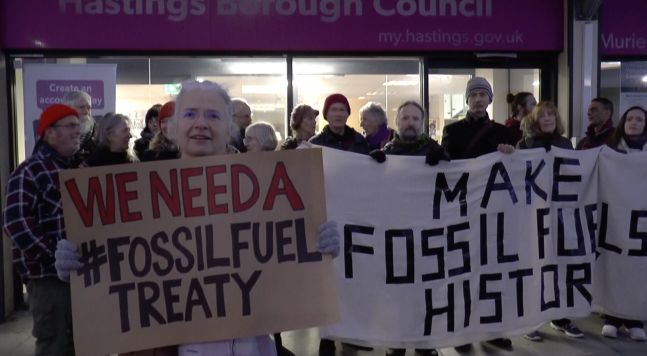Press release
13 July 2022
Divest East Sussex [1]
More info: 07596 483 272
PHOTO: https://tinyurl.com/fftrally9feb [CAPTION: Hastings climate campaigners demanding a #FossilFuelTreaty, outside Muriel Matters House earlier this year. PHOTO: Divest East Sussex]
HASTINGS COUNCIL ENDORSES CALL FOR ‘FOSSIL FUEL TREATY’
It’s time to make fossil fuels history say campaigners
Wednesday 13 July, Muriel Matters House, Hastings: Hastings Borough Council voted to support the call for an international treaty to phase out fossil fuels (a ‘Fossil Fuel Treaty’) at its Full Council meeting tonight. The vote was passed with two abstentions (Cllrs Pragnell and Edwards) and two votes against (Cllrs Marlow-Eastwood and Beaney).
Hastings becomes the ninth local council in the UK to endorse the call for a Fossil Fuel Treaty, following a motion tabled by Hastings Borough Councillor Sabina Arthur (Labour, Braybrooke) [2]. The vote, which was repeatedly postponed due to covid restrictions, was originally scheduled to take place in December 2021.
Burning fossil fuels (oil, coal & gas) is the main driver of climate change [3]. Massive reductions in carbon emissions are needed before 2030 if the world’s governments are to follow through on their stated commitment to hold global warming to ‘well below’ 2ºC, ‘pursuing’ 1.5ºC [4].
A Fossil Fuel Treaty would be an agreement to end all new fossil fuel exploration and production, phase out existing stockpiles of fossil fuels in line with 1.5ºC, and fast-track a just and peaceful transition to safer and cleaner alternatives [5]. The idea has already been endorsed by over 100 Nobel laureates, as well as scores of cities and sub-national governments, including the City of London and Lewes Town Council [6]. Brighton & Hove City Council agreed a similar motion at its Full Council meeting in February [7].
Last year, a report from the Stockholm Environment Institute found that the ‘the world’s governments plan to produce more than twice the amount of fossil fuels in 2030 than would be consistent with limiting warming to 1.5°C’ [8]. In April the UN Secretary-General, described investing in new fossil fuels as ‘moral and economic madness.’ [9] Yet, the UK Government is planning to launch another licensing round for North Sea oil and gas projects in the autumn [10].
Councillor Arthur’s motion noted that: ‘Climate change is threatening hundreds of millions of lives, livelihoods across every continent and is putting thousands of species at risk. The burning of fossil fuels – coal, oil, and gas – is by far the major contributor to climate change and is responsible for almost 80% of carbon dioxide emissions since the industrial revolution. In addition to being the leading source of emissions, there are local pollution, environmental and health costs associated with extracting, refining, transporting and burning fossil fuels. These costs are often paid by Indigenous peoples of the Global South as well as marginalised communities here in the UK. Hastings is one of the most deprived towns in the country, residents are forced to spend an ever-increasing proportion of their income meeting the exponentially rising costs of energy. Standards of living and health are directly impacted. It is not sustainable to continue to extract and globally transport fossil fuels when genuinely sustainable methods of production may exist locally to meet demand.’ [2]
A spokesperson for Divest East Sussex said: ‘If we’re going to have any chance of avoiding catastrophic climate change then we need to rapidly phase out fossil fuels. Yet governments are still planning to produce vastly more fossil fuels than can ever be safely burned. An internationally agreed Fossil Fuel Treaty could help change this, enabling a just and peaceful transition to a safer and cleaner world. It’s time for a Fossil Fuel Treaty to rapidly phase out fossil fuels and replace them with clean renewable energy for everyone.’
ENDNOTES
[1] https://divesteastsussex.wordpress.com
[2] See item 8. on https://hastings.moderngov.co.uk/documents/g4824/Agenda%20frontsheet%2013th-Jul-2022%2018.00%20Full%20Council.pdf?T=0
[3] ‘Climate Change 2014: Synthesis Report Summary for Policymakers’, section SPM 1.2 ‘Causes of climate change’, https://tinyurl.com/IPCCsynth
[4] The IPCC’s 2018 report ‘Global Warming of 1.5 ºC’ (https://tinyurl.com/ipcconepointfive) included four illustrative 1.5°C pathways. The most precautionary (P1) avoids reliance on bioenergy with carbon capture and storage, a technology that is untested at scale and faces significant feasibility constraints. According to an analysis by CarbonBrief to cut emissions in
line with the IPCC’s P1 illustrative pathway: (a) CO2 emissions from oil must fall by 44 percent by 2030; and (b) CO2 emissions from gas must fall by 39 percent by 2030 (both relative to 2019 levels). The oil and gas decline would need to be even faster if the extremely rapid coal phase-out assumed (nearly 80 percent by 2030) does not prove feasible. See ‘Big Oil Reality Check’, Oil Change Intenational, Sept 2020, tinyurl.com/bigoilrealitycheck, p.7 and ‘Analysis: Why coal use must plummet this decade to keep global warming below 1.5C’, CarbonBrief, 6 February 2020, https://tinyurl.com/coalplummet
[5] https://fossilfueltreaty.org/
[6] See https://www.theguardian.com/environment/2021/apr/21/101-nobel-laureates-call-for-global-fossil-fuel-non-proliferation-treaty and https://fossilfueltreaty.org/endorsements
[7] https://www.brightonandhovenews.org/2022/02/05/councillors-call-for-end-to-fossil-fuel-investments/
[8] ‘The Production Gap: Governments’ planned fossil fuel production remains dangerously out of sync with Paris Agreement limits’, October 2021, https://productiongap.org/wp-content/uploads/2021/11/PGR2021_web_rev.pdf
[9] https://www.un.org/sg/en/node/262847
%5B10%5D https://www.carbonbrief.org/qa-what-does-the-uks-new-energy-security-strategy-mean-for-climate-change/

